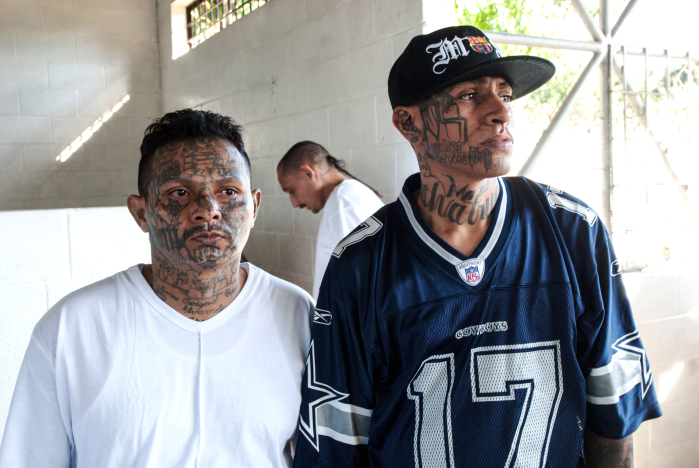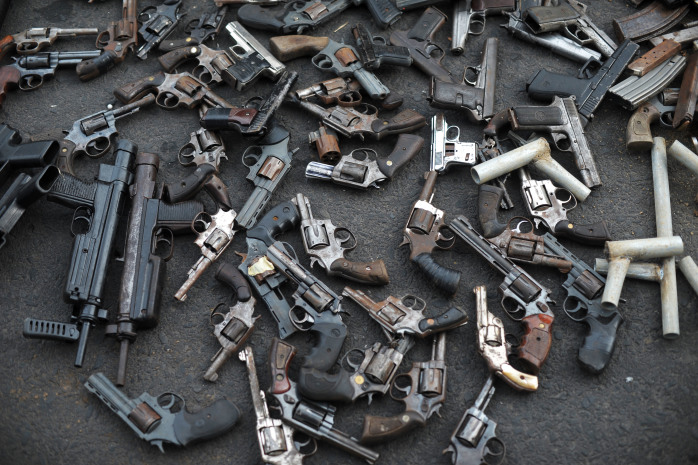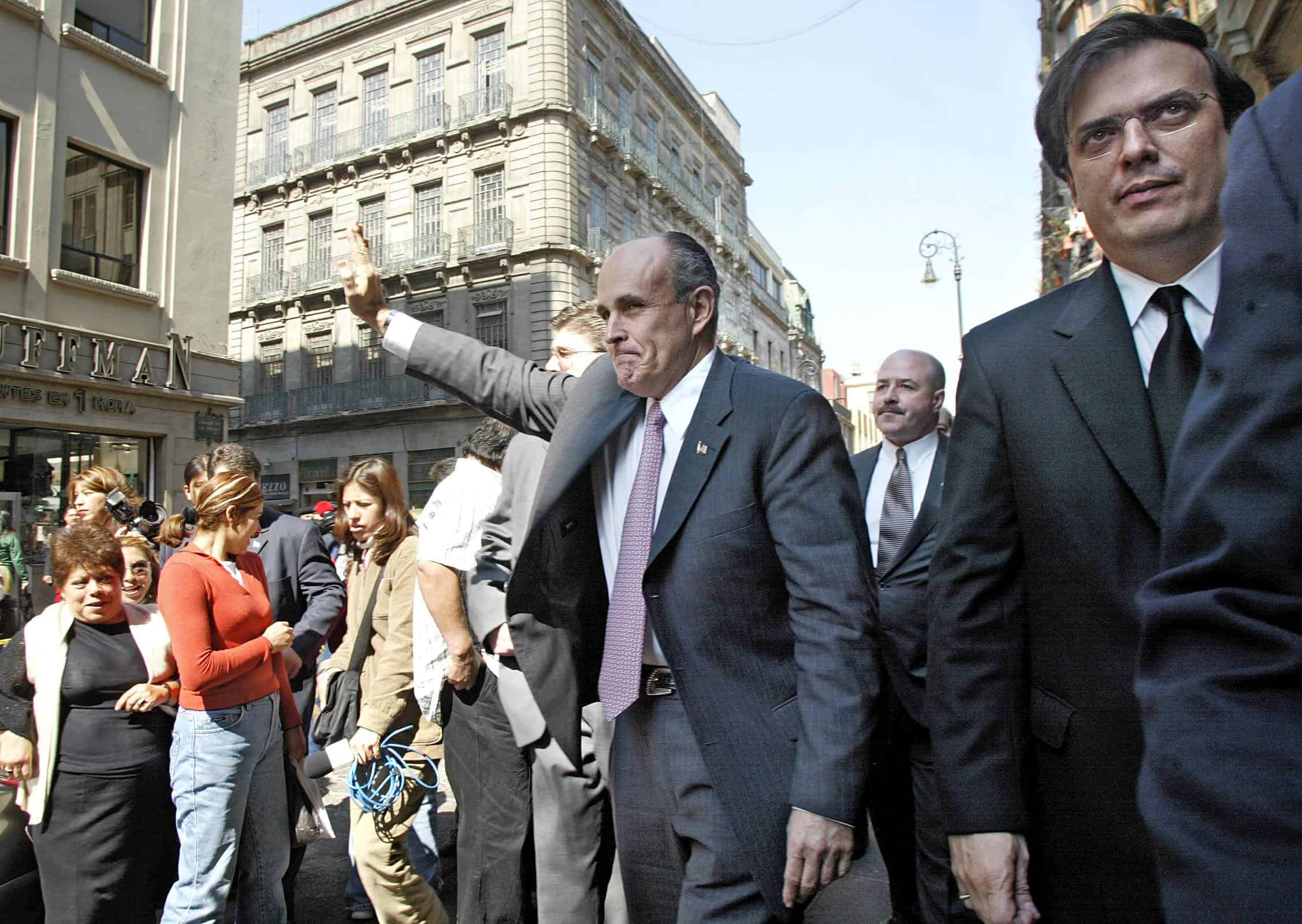Rudolph “Rudy” Giuliani, the former New York City mayor (1994-2001) credited with dramatically reducing crime in the Big Apple, is about to take on a major challenge: advising Salvadoran authorities on how to fight crime in their country.
Hailed by some and criticized by others for his tough approach in taking on NYC’s citizen safety problem, the former mayor this month sent to El Salvador a team of top experts of Giuliani Partners LLC, the company he founded in 2002, headed by the firm’s CEO John Huvane.
The group was called in by El Salvador’s National Private Enterprise Association, or ANEP, to study the country’s critical situation regarding violent crime.
The day after arriving in El Salvador, the four-person group of experts met behind closed doors on Jan. 19 at National Police (PNC) headquarters with members of ANEP, the PNC and the Public Security Ministry.
After the meeting, ANEP President Jorge Daboub told journalists the team was called in at the initiative – and funding – of the private sector to evaluate the country’s situation, and later contribute in drawing up a security and anti-crime strategy for El Salvador.
Daboub then reported the experts would stay for a week, holding meetings with security officials, attorneys, PNC members and civil society and community leaders, as well as visiting prisons and urban areas with high crime rates.
The private-sector leader underlined ANEP’s initiative as a contribution to the Consejo Nacional de Seguridad Ciudadana y Convivencia, or National Citizen Safety Council.
The multi-sector council is made up of representatives of the government, the private sector, the Catholic Church and the media, among others, with support from the European Union, the Organization of American States and the United Nations Development Program.
The council is tasked with seeking strategies to improve security and fight crime in this country of just over 6.1 million people, with a daily average of 10-12 homicides mostly committed by maras, according to official figures.
Salvadoran maras, or gangs, have some 70,000 active members with about 10,000 currently serving prison sentences.

The head of ANEP pointed out that Giuliani’s company will advise on “the attack on crime,” and that the assistance “is a complement” to other initiatives “because a problem like this isn’t solved in one field of action; it has many.”
“The idea is to have top-level advice on a pressing reality Salvadorans are living,” Daboub said. “They have an outline of the problems, but they need to understand them. They tell me, ‘I know there’s extortion, I know there are maras, I know there are homicides, but I need to go where those things are happening.’
“It can’t be that criminals are ruling our lives, controlling our territories,” he added.
For Public Security Minister Benito Lara, ANEP’s proposal “falls within the effort all Salvadorans are making, and is a very important contribution to enrich our public security policy.”
“This is about all the good practices there are in other places and the possibility to implement them. We have to ‘tropicalize’ them,” Lara said.
PNC Director Mauricio Ramírez said the visiting experts requested information on the police force’s weaknesses and strengths, as well as its ongoing programs.
Huvane said last December that the team’s visit to El Salvador “is like going to the doctor for a first checkup and discussing what needs to be done,” according to the Salvadoran newspaper La Prensa Gráfica.
“When we identify findings on some key issues, we’ll be available to help implement [suggestions] if the government and the private sector want,” he added. “We’ve done this in several places.”
Huvane referred to similar work by Giuliani’s company in Latin American nations such as Colombia, El Salvador, Guatemala and México – with Honduras to follow. They also have worked in Europe.
In a Jan. 19 interview by La Prensa Gráfica, Giuliani said that in El Salvador’s case, the team he sent is made up of “experts in corruption reduction, in gangs, in how to reduce those problems with what has worked in New York and what has worked in countries in Latin America and Europe.”
After they complete their current mission, the group will return to New York “and draw up a plan, Giuliani said. “At some point within the next two or three months we’ll hold a summit and we’ll present the plan in El Salvador.”
Giuliani said he hoped to work with Salvadorans to implement that plan in the next two to three years.

On the issue of maras, Giuliani suggested the New York approach to organized crime, stating that gangs “must be placed in categories [and] must be the main targets among the people you arrest [and] take off the streets. If you do, on a social level, a point could be reached where they may want peace.”
Referring to actions he implemented in New York, the former mayor denied they were part of a “zero tolerance” approach.
“Zero tolerance sounds like you’re going to wipe out any crime, and we’re not going to wipe out crime, just like not all crime deserves arrest. There are crimes that are not serious enough, otherwise, everybody would be arrested,” he said.
Giuliani explained that what he implemented in New York was the “broken window” theory, according to which “you can’t let criminals take over the streets; you’ve got to recover the streets, because if you let them take over one, they’ll take over another one, and another one.”
“Just like in a building with one broken window, you then have many broken windows, and the whole building falls apart,” he added.
“So, what we did was to start cleaning up the streets. … The first goal was to make drug pushers leave the streets and go back inside so they wouldn’t bother people outside. If somebody wanted to buy drugs they had to go inside. … With them inside, we could capture them,” he said.
In a statement issued Dec. 2, 2014, ANEP pointed out that by the end of 2001, Giuliani had reduced crime in New York by 60 percent, making it one of the safest cities in the United States. The statement also said that despite the different realities between the city of New York and the country of El Salvador, the former mayor’s “good practices” could be of “great help.”
There also are skeptical voices in El Salvador regarding Giuliani’s approach to crime and violence.
Quoted early last month by La Prensa Gráfica, former police chief Rodrigo Avila and former Public Security Minister Francisco Bertrand Galindo – both currently serving as security advisers – expressed doubts about Giuliani’s expert mission in the country.
Avila told the paper that “comparing figures for El Salvador and New York at its worst moment is almost ridiculous. New York never went above the rate of 32 [homicides] per 100,000,” while two years ago, the Salvadoran rate was 69.2.
In Galindo’s opinion, “the true value of Giuliani’s consultancy could rest on whether we have the capability to do what is suggested.”
Meanwhile, on Jan. 15, Salvadoran President Salvador Sánchez Cerén received from the National Citizen Safety Council a security plan titled “El Salvador Seguro” – “A Safe El Salvador.”
The 124-step action plan’s immediate aim is to increase the state’s presence in the 50 most violent municipalities of a total of 262, providing nationwide coverage.
The plan’s total investment over the five next years is estimated at $1.7 billion, 74 percent of which ($1.5 billion) is earmarked for violence prevention.






